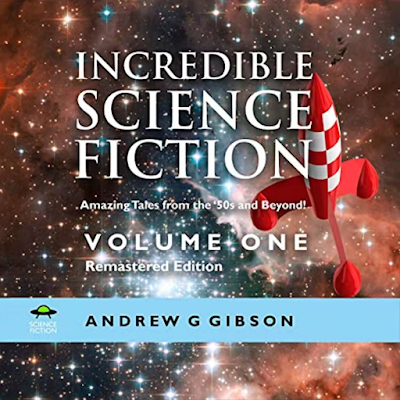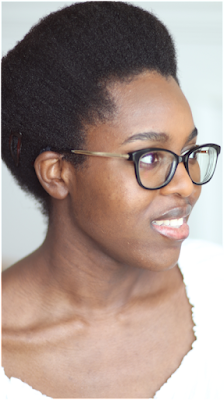Andrew Gibson interview
AUTHOR INTERVIEW
A little introduction:
Andrew Gibson is a lifelong science fiction aficionado, with a specific interest in science fiction from the 1950s. He finds reading old science fiction stories an interesting experience, as they often provide insights about the present, and allow us to look back and reflect on the past. The ’50s was an interesting time, with the threat of nuclear holocaust a real and present danger. The aftermath of World War 2 cast a long shadow over the length of the following decade. The atomic age was characterised by contemporary literature that appeared to only be able to imagine a dark, post-apocalyptic, dystopian future.
When did your love of books begin?
As a child, I struggled to read at all. Despite the best efforts of my parents, I still couldn’t read very well at all by the age of 8. To put this in context of the British education system, my reading level was way below average. I knew the letters of the alphabet and the sounds they made, but that was about all. Words on a page just didn’t make sense to me. They used to swim around like a meaningless soup of letters.
However, I was a highly imaginative child who loved to draw. I was also well above average in other subjects, which I think gave my parents some hope that I wasn’t educationally subnormal. I loved playing outside with my friends and I enjoyed watching Science Fiction TV shows. There were a lot of these while I was growing up, but my favourite was Doctor Who. This was my best-loved show as a child, and I couldn’t get enough of it, back in the 1970s when Tom Baker was Doctor Who.
So how was I able to overcome this mental block that stopped me from reading? The change occurred just before the long summer holiday one year, when my teacher, who was clearly concerned about my lack of reading skills, found out that I was very interested in science fiction in general, and Doctor Who in particular. He gave me a hardback Doctor Who Novel to read. This was a full-length book, with dense type and no pictures. He was sceptical that I would be able to read it, but I assured him I would try.
I can recall staring at the pages, looking at the words, forcing them to make sense. Because it was a book about characters I loved and cared about, I was able to persevere and finish it. That summer, I was delighted to discover that my local library had a large collection of Doctor Who novels in stock. I read about 24 of these novels back-to-back, pretty much non-stop. By the end of that long summer, I didn’t just love reading. My vocabulary had grown exponentially, and my imagination was in overdrive. Reading books helped me to understand the world around me. From that point on, I haven’t stopped reading.
When did you start to have the wish to become an author?
As I’ve mentioned, I was a very imaginative child and would happily spend hours weaving all sorts of implausible narratives with Lego and action men. In my teenage years, I became heavily involved in role-playing games such as AD&D and Warhammer Fantasy Roleplay. My first ever published work was a role-playing game scenario for an independent role-playing magazine publisher. Since my late start in reading, I have devoured perhaps more than my fair share of books. I love all types of literary fiction, science fiction, horror, fantasy, and thrillers. In terms of nonfiction, I’m keen on popular science, astronomy, and astrophysics, I like a bit of philosophy now and then with the occasional smattering of psychology.
However, it was the love of English Literature that spurred me on to study this at university. In retrospect, it was inevitable that I would eventually become a writer. However, this process was more of a gradual evolution into the role, rather than a sudden flash of insight.
How have you found the process for becoming an author?
It requires a lot of focused self-discipline to write a book. You need to have an abundance of self-confidence in what you are doing to write successfully. I personally find that I need vast amounts of free time to find the time to write. I wrote my first book only after I started working at a school. One of the best-kept secrets of working in education is that you seem to spend most of your time on holiday. So far, I have managed to complete at least one book every year during the school holidays.
What would you say to those wanting to become an author?
The more you read, the better writer you will become. Read as widely as possible, both inside and outside of your chosen genre. Do not underestimate the inspirational value of reading bad books. Nothing is more motivational and encouraging than knowing, in the very core of your being, that you could write a much better book than a published author. Find a method of writing that works for you. With the incredible technology that is available to writers now, it is very difficult to find excuses not to write. If you don’t like sitting down and typing, you can narrate your ideas directly into a document by using speech recognition on your phone. Write using a cloud-based service and you can write anywhere. The key to writing is that the more you write, the more you will want to write.
Tell us about your book/books:
I am the author, narrator editor, and curator of the Incredible Science Fiction Series of Books. Every volume of Incredible Science Fiction provides a lovingly curated collection of some of the most iconic science fiction stories published in the 1950s and beyond. Each volume also includes one original science fiction short story by the editor and curator of this series. I have also published a couple of classic science fiction novels, with Audible editions narrated by my brother James: Wolfbane and Search the Sky.
What do you love about the writing/reading community?
I like the way that the writing community gives back what you put in. You must try to be part of a community if you want to gain the most from it. Actively helping other people and giving advice on writing will help your writing to improve. Join a local writing group. In pretty much every town and city in the world, you’ll find a group of like-minded people that are willing to read and discuss your work. For me at least, being part of a writing group acts as a powerful motivating force that keeps me writing.
If you could say anything to your readers what would it be?
If you have enjoyed my work, please recommend it to a friend! I would also like to offer my personal thanks for you taking the time to read or listen to something I have written or edited, narrated, or otherwise produced. I still find it remarkable that people are willing to purchase things that I have written!
Where can people connect with you?
I’m quite active on Twitter, which I use to promote my work. I find that the writing community on Twitter is also very supportive if you are willing to engage with it. I can also be contacted via my official website (which like most authors I know, badly needs an update.) It reminds me of the expression “the shoemakers children go barefoot.”
You can find out more about Andrew's work on www.andrewggibson.com or stay up to date with his most recent releases, by joining the several thousand people that somehow follow Andrew on Twitter: @authoragibson






.jpg)

Comments
Post a Comment